History of Topics 2000
 |
 |
 |
 |
 |
 |
 |
 |
 |
 |
 |
 |
|
- 56th Honinbo league
- Westerners at the Nihon ki-in
- Buy a new go board -- or a house
- Japanese title holders
- Most wins in 2000
- Top women players
- 2nd Nong Shim: Korea one step ahead
- New woman professional
- Teaching tour of Asia
- Cho Sonjin wins Kiriyama play-off
- Kato wins Women's Strongest Player title
- 26th Meijin league starts
- Honinbo league third round
- Amateur Honinbo beats professional Honinbo
- Most wins, most titles
- Yoo wins 5th Samsung Cup
- O Rissei defends Oza title
- Meijin league first round
- Ryu regains Tengen title
- O Rissei takes lead in Oza title
- Cho U takes sole lead in Honinbo league
- Western members of the Nihon Ki-in
28 December
56th Honinbo league
Play in the 56th Honinbo league was wound up for the year with a game played at the Nihon Ki-in last week. The veteran Otake Hideo 9-dan (aged 58) (W) beat one of the more youthful members of the league, Yuki Satoshi 9-dan (aged 28), by resignation. That puts Otake on 2-1, still in contention for the first place if Cho U, the only player on 3-0, stumbles, while Yuki drops out of the running for the time being with 1-2.
Westerners at the Nihon ki-in
The Western members of the Nihon Ki-in have not been very busy in December, their first games not being played until the middle of the month. Their results are as follows:
Michael Redmond
(14 Dec.) Beat Hagiya Kazuhiro 6-dan (W) by resignation (Kisei preliminary).
(18 Dec.) Lost to Kobayashi Satoru 9-dan (B) by 9.5 points (third preliminary round, Fujitsu qualifying).
(21 Dec.) Lost to Yamashita Keigo Gosei (B) by 2.5 points.
Hans Pietsch 4-dan
(13 Dec.) Beat Chinen Kaori Women's Kisei (W) by resignation (Honinbo first preliminary section).
Catalin Taranu 4-dan does not seem to have played any games in December.
Michael Redmond
(14 Dec.) Beat Hagiya Kazuhiro 6-dan (W) by resignation (Kisei preliminary).
(18 Dec.) Lost to Kobayashi Satoru 9-dan (B) by 9.5 points (third preliminary round, Fujitsu qualifying).
(21 Dec.) Lost to Yamashita Keigo Gosei (B) by 2.5 points.
Hans Pietsch 4-dan
(13 Dec.) Beat Chinen Kaori Women's Kisei (W) by resignation (Honinbo first preliminary section).
Catalin Taranu 4-dan does not seem to have played any games in December.
Buy a new go board -- or a house
It's well known that good kaya go boards are expensive -- their price range is actually similar to that of cars, from compacts to large family models. The January 2001 issue of 'Monthly Go World', however, carried an ad for the most expensive board we've seen offered to the general public: 33 million yen. That's over 300,000 dollars, which even in Tokyo will buy you a small house in the suburbs or, with the post-bubble collapse in property prices, a small condominium near the centre Just one board is being offered at this price. It's a six-sun (just over seven inches) board of kaya wood from Yakushima Island (about 60 km south of Kagoshima in Kyushu). It's being offered to commemorate O Rissei's winning of the Kisei title, and the under side of the board is signed by O and his mentor Go Seigen. A top-quality set of go stones is thrown in.
It will be interesting to see if a customer turns up.
It will be interesting to see if a customer turns up.
Japanese title holders
With all title matches for the year 2000 having been completed, this is how the roster of title holders looks at the end of the millennium.
Kisei: O Rissei
Meijin: Yoda Norimoto
Honinbo: O Meien
Judan: Kobayashi Koichi
Tengen: Ryu Shikun
Oza: O Rissei
Gosei: Yamashita Keigo
Shinjin-O (King of the New Stars): Yamashita Keigo
Women's Honinbo: Inori Yoko
Women's Meijin: Aoki Kikuyo
Women's Kisei: Chinen Kaori
Strongest Woman Professional: Shinkai Hiroko
NHK Cup: Yoda Norimoto
Haya-go Champion: Kobayashi Satoru
New Stars (Shin-ei): Yamashita Keigo
NEC Cup: Cho Chikun
NEC Young Stars (Shun'ei): Takao Shinji
Kakusei: O Rissei
Women's Kakusei: Aoki Kikuyo
Ryusei: Takao Shinji
Kiriyama Cup: Cho Sonjin
Okan: Yamashiro Hiroshi
Kisei: O Rissei
Meijin: Yoda Norimoto
Honinbo: O Meien
Judan: Kobayashi Koichi
Tengen: Ryu Shikun
Oza: O Rissei
Gosei: Yamashita Keigo
Shinjin-O (King of the New Stars): Yamashita Keigo
Women's Honinbo: Inori Yoko
Women's Meijin: Aoki Kikuyo
Women's Kisei: Chinen Kaori
Strongest Woman Professional: Shinkai Hiroko
NHK Cup: Yoda Norimoto
Haya-go Champion: Kobayashi Satoru
New Stars (Shin-ei): Yamashita Keigo
NEC Cup: Cho Chikun
NEC Young Stars (Shun'ei): Takao Shinji
Kakusei: O Rissei
Women's Kakusei: Aoki Kikuyo
Ryusei: Takao Shinji
Kiriyama Cup: Cho Sonjin
Okan: Yamashiro Hiroshi
Most wins in 2000
The leading game winners (over 4-dan), as of 21 December, are:
1. Yamashita Keigo Gosei: 58-17
2. Cho U 6-dan: 53-12-1 jigo
3. Hane Naoki 8-dan: 52-23
4. Takao Shinji 7-dan: 47-18
5. Ryu Shikun Tengen: 44-20
6. Kono Rin 5-dan: 43-11
7. Mizokami Tomochika 7-dan: 41-16
8. Yamada Kimio 8-dan: 39-20
9. Han Zenki 5-dan: 35-10; Akiyama Jiro 7-dan: 35-18-1 jigo
11. Kato Atsushi 7-dan: 33-13
12. Kataoka Satoshi 9-dan: 31-11; Yamashiro Hiroshi 9-dan: 31-12; Yoda Norimoto Meijin: 31-13; O Meien Honinbo: 31-16; Nakano Hironari 9-dan: 31-17
17. Nakamura Shinya 7-dan: 30-11; Yamada Takuji 6-dan: 30-12; Kim Shujun 6-dan: 30-13; Ogaki Yusaku 8-dan: 30-16; O Rissei Kisei: 30-18.
Cho Chikun ended in equal 22nd place with an even score of 29-29, a mediocre result for him that reflects his loss of the Kisei and Meijin titles.
The top junior players (4-dan and under) are:
1. Cho Riyu 4-dan: 49-9
2. Matsumoto Takehisa 4-dan: 45-11
3. Takano Hideki 4-dan: 33-10-1 jigo
4. Tsuruyama Atsushi 3-dan: 30-13
5. Sasaki Tsuyoshi 3-dan: 26-9
6. Takemiya Yoko 3-dan: 25-11-1 jigo
7. Ko Iun 2-dan: 24-10-1 jigo
8. Ko Reibun 2-dan: 23-11
9. Yamamori Tadanao 2-dan: 22-7
10. Mochizuki Ken'ichi 2-dan: 21-5; Catalin Taranu 4-dan: 20-15
1. Yamashita Keigo Gosei: 58-17
2. Cho U 6-dan: 53-12-1 jigo
3. Hane Naoki 8-dan: 52-23
4. Takao Shinji 7-dan: 47-18
5. Ryu Shikun Tengen: 44-20
6. Kono Rin 5-dan: 43-11
7. Mizokami Tomochika 7-dan: 41-16
8. Yamada Kimio 8-dan: 39-20
9. Han Zenki 5-dan: 35-10; Akiyama Jiro 7-dan: 35-18-1 jigo
11. Kato Atsushi 7-dan: 33-13
12. Kataoka Satoshi 9-dan: 31-11; Yamashiro Hiroshi 9-dan: 31-12; Yoda Norimoto Meijin: 31-13; O Meien Honinbo: 31-16; Nakano Hironari 9-dan: 31-17
17. Nakamura Shinya 7-dan: 30-11; Yamada Takuji 6-dan: 30-12; Kim Shujun 6-dan: 30-13; Ogaki Yusaku 8-dan: 30-16; O Rissei Kisei: 30-18.
Cho Chikun ended in equal 22nd place with an even score of 29-29, a mediocre result for him that reflects his loss of the Kisei and Meijin titles.
The top junior players (4-dan and under) are:
1. Cho Riyu 4-dan: 49-9
2. Matsumoto Takehisa 4-dan: 45-11
3. Takano Hideki 4-dan: 33-10-1 jigo
4. Tsuruyama Atsushi 3-dan: 30-13
5. Sasaki Tsuyoshi 3-dan: 26-9
6. Takemiya Yoko 3-dan: 25-11-1 jigo
7. Ko Iun 2-dan: 24-10-1 jigo
8. Ko Reibun 2-dan: 23-11
9. Yamamori Tadanao 2-dan: 22-7
10. Mochizuki Ken'ichi 2-dan: 21-5; Catalin Taranu 4-dan: 20-15
Top women players
1. Kato Keiko 2-dan: 36-14
2. Kobayashi Izumi 4-dan: 32-27
3. Umezawa Yukari 4-dan: 31-15
4. Nakazawa Ayako 4-dan: 30-17-1 jigo; Tsukuda Akiko 4-dan: 30-21
The above statistics actually are complete for the whole year, except for one player. Just three games are scheduled for the last week of December, and, of the above-mentioned players, only Umezawa Yukari is playing.
2. Kobayashi Izumi 4-dan: 32-27
3. Umezawa Yukari 4-dan: 31-15
4. Nakazawa Ayako 4-dan: 30-17-1 jigo; Tsukuda Akiko 4-dan: 30-21
The above statistics actually are complete for the whole year, except for one player. Just three games are scheduled for the last week of December, and, of the above-mentioned players, only Umezawa Yukari is playing.
20 December
2nd Nong Shim: Korea one step ahead
Korea is one step ahead in the 2nd Nong Shim Spicy Noodles cup, an international team tournament among China, Korea and Japan, but the second stage of the tournament has been more even than the first, with no player scoring successive wins.
In the first stage, played in Beijing in October, a new star emerged for Korea: the 15-year old Ch'oe Ch'eol-han 3-dan, who won three games in a row before losing to Japan's Kobayashi Satoru.
The second stage was held in Seoul at the end of November , with the following results.
Game 5 (26 Nov.). Shao Weigang 9-dan (W) beat Kobayashi Satoru by half a point.
Game 6 (27 Nov.). Mok Jin-seuk 5-dan (B) beat Shao by resignation.
Game 7 (28 Nov.). Takemiya Masaki 9-dan beat Mok by 10.5 points.
Game 8 (29 Nov.). Chang Hao 9-dan (China) (B) beat Takemiya by 9.5 points.
Takemiya's win over Mok was his best game in international go for quite a while and ended up with an interesting shape: his main territory was heart-shaped. He seemed to try the same strategy in his game against Chang, but the heart shape was flawed and he lost (we realize, of course, that it wasn't really an intentional strategy in either case).
The result is that Korea is a step ahead, with three players left to Japan's two and China's two. Korea has Cho Hun-hyun, Lee Chang-ho and Choi Myung-hun; China has Chang Hao and Yu Bin; and Japan has Yamashita Keigo and Kato Masao. Korea has monopolized this team tournament (for the first five terms, it was the LG Jinro Cup) and once again must be counted the favourite.
The final round will be played in March.
In the first stage, played in Beijing in October, a new star emerged for Korea: the 15-year old Ch'oe Ch'eol-han 3-dan, who won three games in a row before losing to Japan's Kobayashi Satoru.
The second stage was held in Seoul at the end of November , with the following results.
Game 5 (26 Nov.). Shao Weigang 9-dan (W) beat Kobayashi Satoru by half a point.
Game 6 (27 Nov.). Mok Jin-seuk 5-dan (B) beat Shao by resignation.
Game 7 (28 Nov.). Takemiya Masaki 9-dan beat Mok by 10.5 points.
Game 8 (29 Nov.). Chang Hao 9-dan (China) (B) beat Takemiya by 9.5 points.
Takemiya's win over Mok was his best game in international go for quite a while and ended up with an interesting shape: his main territory was heart-shaped. He seemed to try the same strategy in his game against Chang, but the heart shape was flawed and he lost (we realize, of course, that it wasn't really an intentional strategy in either case).
The result is that Korea is a step ahead, with three players left to Japan's two and China's two. Korea has Cho Hun-hyun, Lee Chang-ho and Choi Myung-hun; China has Chang Hao and Yu Bin; and Japan has Yamashita Keigo and Kato Masao. Korea has monopolized this team tournament (for the first five terms, it was the LG Jinro Cup) and once again must be counted the favourite.
The final round will be played in March.
New woman professional
The Nihon Ki-in 2000 professional qualifying tournament for women was completed on 25 November. The tournament is an all-play-all league and only the winner qualifies as professional shodan. The tournament was decided in the final round with a clash between Suzuki Ayumi, who was the sole leader on 9-1 and Nakajima Mieko, who was in second place on 8-2. Suzuki won this game and so won the tournament 10-1.
The 17-year-old Suzuki is a disciple of Iwata Hajime 8-dan. She will make her pro debut next April.
The 17-year-old Suzuki is a disciple of Iwata Hajime 8-dan. She will make her pro debut next April.
Teaching tour of Asia
Two Nihon Ki-in professionals, Abe Yoshiteru 9-dan and Yamamoto Masato 7-dan, toured three Asian countries, India, Malaysia and Thailand, from 9 to 24 November. Their trip was sponsored by the Agency for Cultural Affairs. In each country, their activity was focussed almost completely on elementary and junior high schools.
In India, go is still in a very early stage and the game is not yet widely known. In Thailand, in contrast, the game has already been widely diffused, thanks in large part to the efforts of Mr. Korsak Chairasmisak, who has taken advantage of his position as president of Seven Eleven Thailand to promote the game, both among the company's employees and in schools and universities throughout the country.
In Malaysia, the professionals visited Kuala Lumpur and Penang, where they held introductory classes for students of Japanese in local universities.
In India, go is still in a very early stage and the game is not yet widely known. In Thailand, in contrast, the game has already been widely diffused, thanks in large part to the efforts of Mr. Korsak Chairasmisak, who has taken advantage of his position as president of Seven Eleven Thailand to promote the game, both among the company's employees and in schools and universities throughout the country.
In Malaysia, the professionals visited Kuala Lumpur and Penang, where they held introductory classes for students of Japanese in local universities.
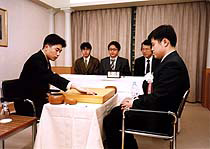
Cho Sonjin wins Kiriyama play-off
Once again, Japan has been victorious in the Japan-China Agon Kiriyama Cup play-off. Last year Kobayashi Koichi defeated Ma Xiaochun in a game played in Beijing on 12 January. This year the schedule has been speeded up a little and the second play-off was held at the Hotel Okura in Tokyo on 7 December. Playing black, Cho Sonjin 9-dan defeated Zhou Heyang 8-dan, forcing him to resignaiton after 173 moves.
This is Cho's first victory in international go and it indicates that his good form is continuing, so O Rissei may be in for serious opposition in the upcoming Kisei title match.
In an associated event, a professional-amateur game was played on the same day as entertainment for the spectators who had come to see a public commentary on the play-off. The professional was Ma Xiaochun 9-dan and the amateur was Hiraoka Satoshi 8-dan, a former WAGC champion. Hiraoka played black, giving no komi, but not surprisingly he lasted only 146 moves against Ma before he had to throw in the towel.
This is Cho's first victory in international go and it indicates that his good form is continuing, so O Rissei may be in for serious opposition in the upcoming Kisei title match.
In an associated event, a professional-amateur game was played on the same day as entertainment for the spectators who had come to see a public commentary on the play-off. The professional was Ma Xiaochun 9-dan and the amateur was Hiraoka Satoshi 8-dan, a former WAGC champion. Hiraoka played black, giving no komi, but not surprisingly he lasted only 146 moves against Ma before he had to throw in the towel.
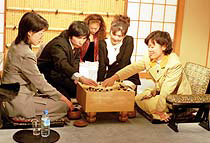

Kato wins Women's Strongest Player title
The final of the 2nd Tokyo Precision Instruments Cup: The Strongest Women Player tournament was held on 5 December. Playing white, Kato Tomoko 4-dan defeated Aoki Kikuyo 8-dan by 1.5 points to win her first title for five years.
This tournament is open to only 32 players. The holders of the other four main women's titles (Women's Honinbo, Women's Meijin, Women's Kakusei, and Women's Kisei) are seeded; the remaining places go to the top players in the prize-money lists, with at least five places being reserved for Kansai Ki-in players.
Last year the winner was Shinkai Hiroko 5-dan, taking her first title, but this year she lost in the first round to Kato.
The latter continued by defeating Yashiro Kumiko 3-dan, a finalist last year, and Sugiuchi Kazuko 8-dan (her teacher) to reach the final, where she prevailed over Aoki, one of only two female 8-dans in Japan.
This is the 31-year-old Kato's third title overall. She won the Women's Honinbo in 1992 and the Women's Meijin in 1995 and at the time looked like becoming one of the dominant women players, but then she lay low for the rest of the the 90s. Perhaps this new success will revitalize her career.
This tournament is open to only 32 players. The holders of the other four main women's titles (Women's Honinbo, Women's Meijin, Women's Kakusei, and Women's Kisei) are seeded; the remaining places go to the top players in the prize-money lists, with at least five places being reserved for Kansai Ki-in players.
Last year the winner was Shinkai Hiroko 5-dan, taking her first title, but this year she lost in the first round to Kato.
The latter continued by defeating Yashiro Kumiko 3-dan, a finalist last year, and Sugiuchi Kazuko 8-dan (her teacher) to reach the final, where she prevailed over Aoki, one of only two female 8-dans in Japan.
This is the 31-year-old Kato's third title overall. She won the Women's Honinbo in 1992 and the Women's Meijin in 1995 and at the time looked like becoming one of the dominant women players, but then she lay low for the rest of the the 90s. Perhaps this new success will revitalize her career.
26th Meijin league starts
The first two games in the 26th Meijin league were played on 7 December. In one of them, O Rissei Kisei (W) defeated Rin Kaiho 9-dan by 6.5 points. In the other, Komatsu Hideki 9-dan (W) defeated Kato Masao by resignation.
Honinbo league third round
Two more games were played in the third round of the 56th Honinbo league on 7 December. In one of them, Cho Chikun kept his chances of becoming challenger alive by defeating Hane Naoki 8-dan by 1.5 points. Cho had white. In the other game, Oya Koichi 9-dan got off the mark by scoring his first win. Playing black, he defeated Yamada Kimio 8-dan by 1.5 points.
The leader of the league is Cho U, with 3-0. He is followed by two players on 2-1: Cho Chikun and Cho Sonjin. Following on 1-2 are Hane and Oya. Yet to play their third-round games are Otake Hideo (1-1) and Yuki Satoshi (1-1). Yamada is in last place with 0-3. His bad form in the league is not of a piece with his other results this year; his record for the year is 32-12 (as of the end of October) and he has reached the final of a world championship, the Samsung cup.
The leader of the league is Cho U, with 3-0. He is followed by two players on 2-1: Cho Chikun and Cho Sonjin. Following on 1-2 are Hane and Oya. Yet to play their third-round games are Otake Hideo (1-1) and Yuki Satoshi (1-1). Yamada is in last place with 0-3. His bad form in the league is not of a piece with his other results this year; his record for the year is 32-12 (as of the end of October) and he has reached the final of a world championship, the Samsung cup.
Amateur Honinbo beats professional Honinbo
The 38th Professional vs. Amateur Honinbo game was held last week and both players were making their debut in this annual series. The new professional Honinbo is O Meien, of course, and his amateur counterpart is Iwai Ryuichi. Last year the amateur won on three stones (black giving 2.5 komi), so this year he played on two stones and received five points komi. The latter proved to be too much for O and Iwai won the game by four points.
In the late 60s and 70s, the amateurs were able to keep on black (though usually getting a komi as well), so the target for amateur Honinbos in the 21st century will be to get back to this handicap.
In the late 60s and 70s, the amateurs were able to keep on black (though usually getting a komi as well), so the target for amateur Honinbos in the 21st century will be to get back to this handicap.
Most wins, most titles
Below is a list of the top game-winners, as of 1 December 2000.
1. Rin Kaiho: 1161 wins, 689 losses, 2 jigo, 1 no-result
2. Kato Masao: 1151-580-2
3. Kobayashi Koichi: 1062-511-2
4. Cho Chikun: 1041-519-3-4
5. Otake Hideo: 1037-611-5-1
6. Sakata Eio: 1028-643-10
7. Hane Yasumasa: 974-476-5
8. Takemiya Masaki: 894-528-2
9. Ishida Yoshio: 851-483
10. Fujisawa Shuko (Hideyuki): 850-647-4
Just failing to make the list is Kudo Norio, with 836-494-4. Since Shuko has retired, Kudo will soon displace him.
The top title-winners are;
1. Sakata Eio: 64
2. Cho Chikun: 61
3. Kobayashi Koichi: 52
4. Otake Hideo: 47
5. Kato Masao: 44
6. Rin Kaiho: 35
7. Fujisawa Shuko: 24
8. Yoda Norimoto: 23
9. Ishida Yoshio: 23
10. Takemiya Masaki: 20
In 11th place is Takagawa Shukaku with 18.
Cho had been expected to overtake Sakata by about this time, but he has fallen into a slump just three titles short. It's hard to imagine he won't make a comeback, but picking up the three titles he needs may be tough going. Another point: Yoda's appearance in the list may seem natural, considering he's now Meijin, but actually he's won far fewer top-seven titles than any of the others: just one Meijin, two Judan and three Gosei titles. Yoda really cleaned up in the minor titles in his 20s; now he's started to redress the balance.
1. Rin Kaiho: 1161 wins, 689 losses, 2 jigo, 1 no-result
2. Kato Masao: 1151-580-2
3. Kobayashi Koichi: 1062-511-2
4. Cho Chikun: 1041-519-3-4
5. Otake Hideo: 1037-611-5-1
6. Sakata Eio: 1028-643-10
7. Hane Yasumasa: 974-476-5
8. Takemiya Masaki: 894-528-2
9. Ishida Yoshio: 851-483
10. Fujisawa Shuko (Hideyuki): 850-647-4
Just failing to make the list is Kudo Norio, with 836-494-4. Since Shuko has retired, Kudo will soon displace him.
The top title-winners are;
1. Sakata Eio: 64
2. Cho Chikun: 61
3. Kobayashi Koichi: 52
4. Otake Hideo: 47
5. Kato Masao: 44
6. Rin Kaiho: 35
7. Fujisawa Shuko: 24
8. Yoda Norimoto: 23
9. Ishida Yoshio: 23
10. Takemiya Masaki: 20
In 11th place is Takagawa Shukaku with 18.
Cho had been expected to overtake Sakata by about this time, but he has fallen into a slump just three titles short. It's hard to imagine he won't make a comeback, but picking up the three titles he needs may be tough going. Another point: Yoda's appearance in the list may seem natural, considering he's now Meijin, but actually he's won far fewer top-seven titles than any of the others: just one Meijin, two Judan and three Gosei titles. Yoda really cleaned up in the minor titles in his 20s; now he's started to redress the balance.
Yoo wins 5th Samsung Cup
Yoo Chang Hyuk 9-dan of Korea has won his first, and Korea's fourth, Samsung Cup. In the final, he defeated Japan's Yamada Kimio 8-dan 3-1. This is Yoo's fourth world title: he has also won the Fujitsu Cup twice and the Ing Cup once. To complete a clean sweep he still has to win the TV Asia Cup and the Chunlan Cup.
The schedule for the final was a little irregular. The first game was played in Korea on 23 November, with the remaining four being scheduled for a five-day period in mid-December (in Seoul). This kind of scheduling is possible with a short time allowance of three hours per player, but even so it must be rather hard on the players. As it turned out, the match didn't go the full distance. Actually, none of the games went the full distance either, all being completed under 200 moves, which perhaps indicates that both sides played aggressively.
The result, 1-3, may seem disappointing for Yamada Kimio, but, considering that he's not a title-holder in Japan, he should be given full credit for his good performance in reaching the final of a world championship. And he did at least avoid a shut-out.
The results:
Game 1 (23 Nov.). Yoo (W) by resig. (186 moves).
Game 2 (11 Dec.). Yoo (B) by resig. (187 moves).
Game 3 (12 Dec.). Yamada (B) by resig. (185 moves).
Game 4 (14 Dec.). Yoo (B) by resig. (173 moves).
The schedule for the final was a little irregular. The first game was played in Korea on 23 November, with the remaining four being scheduled for a five-day period in mid-December (in Seoul). This kind of scheduling is possible with a short time allowance of three hours per player, but even so it must be rather hard on the players. As it turned out, the match didn't go the full distance. Actually, none of the games went the full distance either, all being completed under 200 moves, which perhaps indicates that both sides played aggressively.
The result, 1-3, may seem disappointing for Yamada Kimio, but, considering that he's not a title-holder in Japan, he should be given full credit for his good performance in reaching the final of a world championship. And he did at least avoid a shut-out.
The results:
Game 1 (23 Nov.). Yoo (W) by resig. (186 moves).
Game 2 (11 Dec.). Yoo (B) by resig. (187 moves).
Game 3 (12 Dec.). Yamada (B) by resig. (185 moves).
Game 4 (14 Dec.). Yoo (B) by resig. (173 moves).
O Rissei defends Oza title
In a wild and rambunctious 4th game, O Rissei staged an upset in byo-yomi that kept him the Oza title for another year.
After losing the first game, O bounced back in the second, winning a game that could easily have gone either way by half a point. He then scored a convincing win in the third game. The fourth game was held in Tokyo on 14 December. Playing white, O forced Cho to resignaiton after 208 moves, so he retained his title with a 3-1 score. The game finished at 9:30 pm.
Games between O and Cho are always fierce, being full of fighting from start to finish. Even by their usual standards, however, this fourth game was a wild affair. O got off to a bad start, so after that he seized every opportunity to start a fight. There were clashes in every area of the board, but Cho managed to keep his lead right up until the last few moves, when he made a bad mistake in byo-yomi. This revived a dead white group and killed the surrounding black group, so he had to resignaiton. For the second year in a row, his challenge for the Oza had been beaten back by a 3-1 margin and each time with the same pattern, the challenger winning the first game but losing the next three.
This is O's 14th title. He has now held the Oza title for three years in a row. This is only fitting, as Oza means 'throne' and O means 'king'.
After losing the first game, O bounced back in the second, winning a game that could easily have gone either way by half a point. He then scored a convincing win in the third game. The fourth game was held in Tokyo on 14 December. Playing white, O forced Cho to resignaiton after 208 moves, so he retained his title with a 3-1 score. The game finished at 9:30 pm.
Games between O and Cho are always fierce, being full of fighting from start to finish. Even by their usual standards, however, this fourth game was a wild affair. O got off to a bad start, so after that he seized every opportunity to start a fight. There were clashes in every area of the board, but Cho managed to keep his lead right up until the last few moves, when he made a bad mistake in byo-yomi. This revived a dead white group and killed the surrounding black group, so he had to resignaiton. For the second year in a row, his challenge for the Oza had been beaten back by a 3-1 margin and each time with the same pattern, the challenger winning the first game but losing the next three.
This is O's 14th title. He has now held the Oza title for three years in a row. This is only fitting, as Oza means 'throne' and O means 'king'.
Meijin league first round
The first round of the Meijin league was completed with two games played on 14 December. In one, O Meien 9-dan (W) defeated Hane Naoki 8-dan by 1.5 points. In the other, Cho Sonjin 9-dan (W) beat the new Tengen, Ryu Shikun, by 6.5 points.
The other two winners in the first round are O Rissei and Komatsu Hideki. Cho Chikun had a bye.
The other two winners in the first round are O Rissei and Komatsu Hideki. Cho Chikun had a bye.
04 December
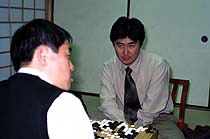
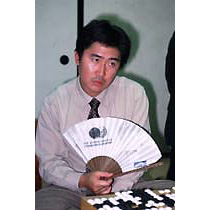
Ryu regains Tengen title
In the third game of the 26th Tengen title match, held in the town of Chinzei in Saga Prefecture, on 30 November, Ryu Shikun 7-dan (B) defeated Kobayashi Koichi by half a point. The game finished at 9 pm after 245 moves. This was Ryu's third successive win by half a point, so he regained the title that he lost in 1997. Ryu had held it for three years in a row, from 1994 to 1996, so this is his fourth Tengen title.
This is the first time that a player has won a title with straight wins by half a point. The only comparable feat is that by Kato Masao way back in 1983, when he won the 21st Judan title from Cho Chikun with half-point wins in the first, second and fifth games.
One advantage of Ryu's winning a title is that he will stop being a lowly (relatively speaking) 7-dan. Ryu seems to take little interest in rising up the dan ladder.
He earned promotion to 7-dan on 24 April 1996, so he has spent more than four and a half years at a rank that most top players pass through in two to three years. After winning the Tengen title as a 6-dan, he has presumably focussed all his energies on earning league places and winning titles rather than on the Oteai.
Ryu also won the Oza title in 1996, so this is his fifth big title and his seventh in all.
This is the first time that a player has won a title with straight wins by half a point. The only comparable feat is that by Kato Masao way back in 1983, when he won the 21st Judan title from Cho Chikun with half-point wins in the first, second and fifth games.
One advantage of Ryu's winning a title is that he will stop being a lowly (relatively speaking) 7-dan. Ryu seems to take little interest in rising up the dan ladder.
He earned promotion to 7-dan on 24 April 1996, so he has spent more than four and a half years at a rank that most top players pass through in two to three years. After winning the Tengen title as a 6-dan, he has presumably focussed all his energies on earning league places and winning titles rather than on the Oteai.
Ryu also won the Oza title in 1996, so this is his fifth big title and his seventh in all.
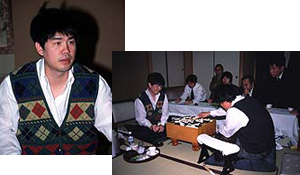
O Rissei takes lead in Oza title
The third game in the 48th Oza title match was played in Toyooka City in Hyogo Prefecture on 30 November. Playing black, O Rissei, the defending champion, defeated the challenger, Cho Chikun, by 6.5 points after 259 moves. This gave O the lead in the title match for the first time.
The fourth game will be played at the Royal Park Hotel in Nihonbashi, Tokyo, on 14 December.
The fourth game will be played at the Royal Park Hotel in Nihonbashi, Tokyo, on 14 December.
Cho U takes sole lead in Honinbo league
By chance, the first game to be played in the third round of the 56th Honinbo league matched the leaders of the league. It was a contest between two Chos (their names are actually written with different characters) and the younger one prevailed. On 30 November, the 20-year-old Cho U 6-dan, playing black, defeated Cho Sonjin 9-dan, who is ten years his senior, by 2.5 points.
That leaves Cho U as the only undefeated player, so he is guaranteed to end the old millennium as the sole leader of the league. It's beginning to look as if Cho might follow in the footsteps of his teacher, Rin Kaiho, and establish himself as a top player in his early 20s (he turns 21 on 20 January.)
That leaves Cho U as the only undefeated player, so he is guaranteed to end the old millennium as the sole leader of the league. It's beginning to look as if Cho might follow in the footsteps of his teacher, Rin Kaiho, and establish himself as a top player in his early 20s (he turns 21 on 20 January.)
Western members of the Nihon Ki-in
No games were played by the three Western members of the Nihon Ki-in in the second half of November.
